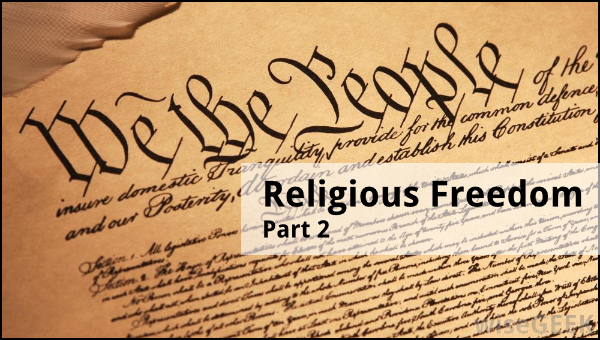By Tyson Thorne

If you haven’t read yesterday’s post yet, you will want to do that before reading any further here. Today we’re examining what “religious freedom” means for people of the Muslim faith in America. Obviously all American’s receive the same protections from government contained in the Constitution, including Muslim American’s. They also receive the same religious freedoms – and limitations to that freedom – as every other American which, oddly, works against them more than it does most religions. This is due to their faith being bound to an equally sacred civic law.
[Editor’s Note: Islam is unique in this regard. While Judaism also had civic laws, they were entwined with religious law as the nation was under the rule of God. The Jewish civic laws were also only binding in Israel, not in other nations, whereas their religious law applied to the person no matter where he might be. In Christianity, there is no civic law and the people try to influence government toward just and moral rule. Only Islam carries with its people a civic law that they are to practice in any nation.]
As we’ve discussed before, Sharia Law is the second half of Islam (the Quran being the first) and is at odds with the US Constitution. After reading it one might even conclude that it is subversive to the Constitution. It denies liberties to those US law grants them, its punishments for laws are severe by comparison and it upholds no contracts save those between fellow Muslims. Practicing Sharia law in the United States should result in a prison sentence, even though we have “religious freedom”. Here’s why.
The first test of religious freedom in the United States came in 1862 when the Congress passed the anti-bigamy law, in direct response to the spread of Mormonism. The law was tested in the courts, coming before the Supreme Court in 1879. They unanimously ruled the law could be upheld stating, “Laws are made for the government of actions, and while they cannot interfere with mere religious belief and opinions, they may with practices.” In other words, while the government has no right to tell one what to believe, it can curtail the exercise of beliefs. While Mormonism may believe and teach that God has no objection to a man having more than one wife, US law requires that a man have no more than one wife at a time. To defy this law means jail time. The same is true for the practice of Sharia.
What does this mean? Only that half of Islam cannot be legally practiced in the United States. Yet it goes beyond even that, for some of the religious practices taught by the Quran also violate US law. Take the path of Jihad, for example. There is nothing “extreme” about it, and jihadists have not been “radicalized”. Rather, the jihadist is following one of two paths in Islam for salvation. One path is a works-based salvation, doing enough good to outweigh the bad in one’s life. Since you can never know for certain how Allah’s scales will find you, this is a bit of a gamble. The path of Jihad, on the other hand, guarantees entry into Paradise so long as one dies fighting for Allah. Become a jihadist in the US, though, and you become an “enemy combatant” at best, and possibly even an “enemy of the State”.
The end result is that only about 40% (and that’s a generous figure) of Islam can be practiced without violating the law. If I were a Muslim, and knew that my salvation was based on how “good” a life I have lived, the USA is one of the last places I would want to call home. Be that as it may, many still do and those people are protected by the same Constitution and laws that every other American is. As long as Muslims are satisfied with this, then they will enjoy the same level of religious freedom as Christians, Jews, and others – and deservedly so. After all, the Constitution was written to protect all Americans for all people were created equally.
So we see that under US law the Southern Baptist Convention and its arms in fact help the cause of justice by helping a Muslim mosque navigate our legal system. In this regard, right was done. What does the Bible’s standard say about the matter? We’ll find out tomorrow. Until then, some food for thought:
“But you must return to your God, by maintaining love and justice, and by waiting for your God to return to you.” – Hosea 12.6
|
|